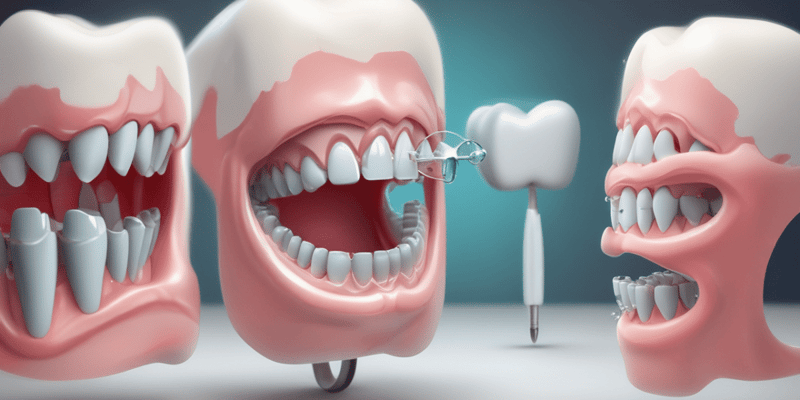Questions and Answers
Which type of handle is designed to prevent brush slipping during brushing?
Slip prevention grip handle
What is the primary benefit of a flexible handle toothbrush?
Less gum injury
Which head design has a curved shape and multiple bristles at the edge of the head?
Superbrush
What is the diameter of soft bristles?
Signup and view all the answers
Which bristle pattern is typically found in block form?
Signup and view all the answers
What is the recommended frequency for changing a toothbrush?
Signup and view all the answers
What is the desired diameter of toothbrush bristles?
Signup and view all the answers
Which material is commonly used for artificial toothbrush bristles?
Signup and view all the answers
What characteristic do toothbrush bristles with rounded tips have?
Signup and view all the answers
Which type of bristle material predominates in the market?
Signup and view all the answers
Which property is not a desirable characteristic for bristles?
Signup and view all the answers
Who performs professional debridement?
Signup and view all the answers
What is the primary etiologic factor for dental and periodontal diseases?
Signup and view all the answers
How often should well-trained individuals in controlled, supervised environments perform oral hygiene?
Signup and view all the answers
Which method of plaque control is considered the most dependable?
Signup and view all the answers
What type of substance is plaque?
Signup and view all the answers
What is the recommended frequency of personal oral hygiene for most patients?
Signup and view all the answers
How quickly can plaque grow on intraoral hard surfaces?
Signup and view all the answers
What role do chemical agents play in plaque control methods?
Signup and view all the answers
What is critical for the maintenance of oral health?
Signup and view all the answers
Which of the following is NOT a critical factor in plaque control?
Signup and view all the answers
Study Notes
Handle
- Straight handle: easier to control, conventional brushes
- Flexible handle: reduces gum injury
- Contra-angle handle: accesses difficult areas
- Slip prevention grip handle: prevents brush slipping during brushing
Head Design & Size
- Conventional head design: standard brush heads
- Diamond head design: diamond-shaped heads
- Superbrush head design: curved shape with multiple bristles at the edge
- Ozone head design: round head
Bristles
- Block pattern: bristles in a block pattern
- Wavy or V-shape pattern: wavy or v-shaped bristles
Hardness
- Soft: 0.2 mm in diameter
- Medium: 0.3 mm in diameter
- Hard: 0.4 mm in diameter
Non-Surgical Periodontal Therapy
Bristles
- Rounded tips: desired bristle shape
- 0.2 mm: desired bristle diameter
Bristle Materials
- Natural: from hogs
- Artificial: made of nylon
Toothbrush Replacement
- Wear pattern: brushes show wear within a few months
- Replacement: every 3-4 months
Plaque
- Structured, resilient, yellow-grayish substance on intraoral hard surfaces
- Primary etiologic factor for dental and periodontal diseases
- Grows within hours
- Löe et al. 1965
Plaque Control
- Regular removal of dental plaque and prevention of accumulation on teeth and adjacent gingiva
- Critical in:
- Prevention and treatment of dental and periodontal diseases
- Maintenance of oral health
Non-Surgical Periodontal Therapy
Plaque Control Methods
- Personal Oral Hygiene: performed by the patient
- Professional Debridement: performed by the dentist or hygienist
Frequency
- Everyday:
- Well-trained individuals: once every 48 hours
- Most patients: twice per day
Plaque Control Methods
- Mechanical: most dependable way
- Chemical: adjunctive agents to mechanical
Studying That Suits You
Use AI to generate personalized quizzes and flashcards to suit your learning preferences.




